#BUCPUA Professor reveals how to land the best job ever

On September 29, more than 250 policymakers and job seekers gathered at the 8th Annual Massachusetts Green Careers Conference, held at the DCU Center in Worcester. BU City Planning and Urban Affairs (BUCPUA) Adjunct Faculty Professor Eugene Benson, JD addressed the entire crowd and also led a smaller breakout session. Benson compelled the audience to pursue the best job ever – municipal conservation agent.
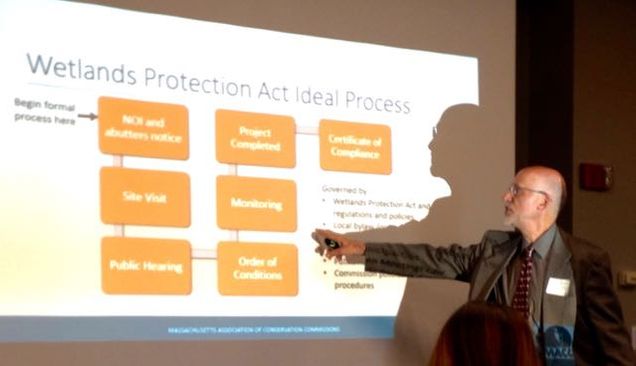
Passionate degree candidates in the #BUCPUA Program assess the social contexts and economic structures that influence the management of fragile open spaces, such as wetlands. The #BUCPUA Program provides students with high-demand tools and pertinent skills to excel as environmental planners. Relevant course offerings include UA 521 Environmental Law, UA 617 Applied Sustainability, UA 654 Geographic Information Systems for Planners, and UA 629 Urbanization and the Environment. Students can complement their Master of City Planning or Master of Urban Affairs degree with a Certificate of Applied Sustainability.
Aside from teaching law to #BUCPUA students, Benson is the Executive Director of the Massachusetts Association of Conversation Commissions (MACC). MACC’s tenants include advocacy, education, and conservation, and the state leader in providing education and training to more than 2,500 conservation commissioners. Benson urged participants to fully grasp the wetlands crisis in the United States, as half the country’s wetlands have disappeared since settlement by Europeans. This loss of wetlands has exacerbated flood conditions, particularly in states like Iowa, which has lost 80 percent of its wetlands. Wetlands perform invaluable functions by buffering floodwaters, capturing carbon, and providing habitats that sustain biodiversity.
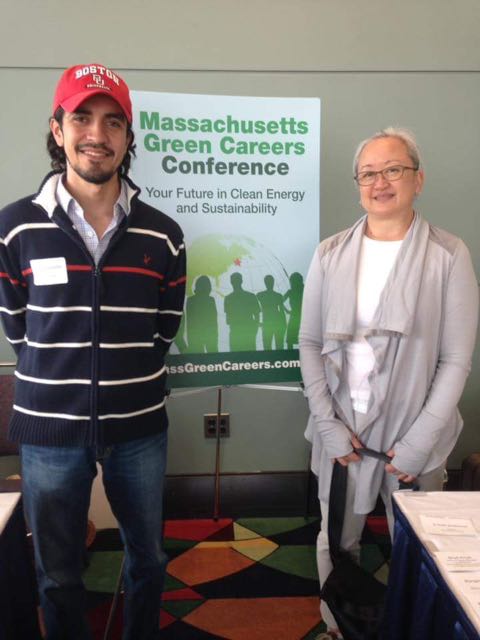
As municipal conservation agents, citizens have a direct stake over the protection and management of these vital, yet vulnerable, areas that envelop land, water, and biological resources. Conservation agents are full-time positions that support and guide all-volunteer municipal conservation commissions. On average, volunteer conservation commissions experience a 10 percent annual turnover, which underscores the value of a municipal conservation agent who can create a stable foundation for long-term planning and land management.
At the state level, the Massachusetts Department of Environmental Protection, the Massachusetts Department of Conservation and Recreation, and Massachusetts Regional Planning Agencies also offer full-time positions that directly influence the protection of open spaces. Qualifications required for state or municipal conservation agent positions include a thorough understanding of environmental law and superb communication skills that conform when influencing different stakeholder groups. Organization skills, creativity, and flexibility also help conservation agents preserve open spaces against myriad external factors, including impacts of climate change and ongoing economic development.
Aside from teaching law in the #BUCPUA Program, Professor Benson also instructs courses at the BU School of Public Health.
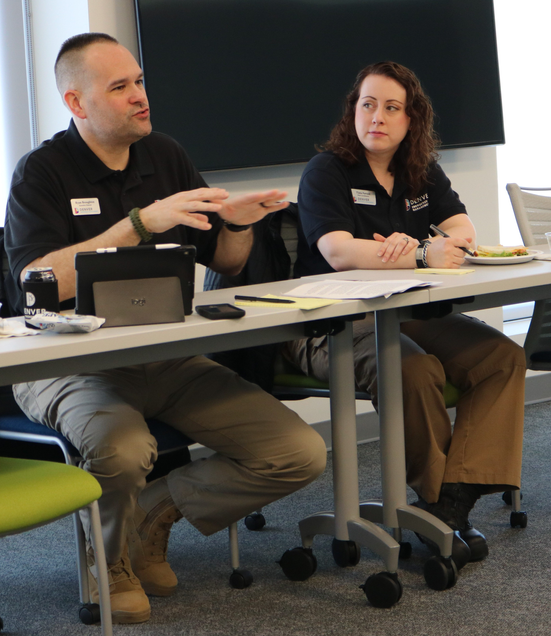
#BUCPUA Lunch N’ Learn Addresses the Role of Emergency Management in Ensuring Resilient Cities
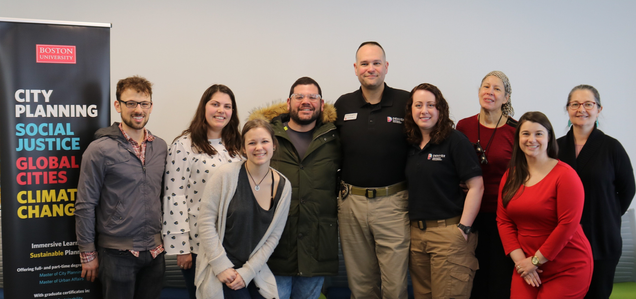
The Boston University City Planning and Urban Affairs Program hosted a lunch n' learn, The Role of Emergency Management in Ensuring Resilient Cities, on March 25, 2019, with guest speakers Ryan Broughton, CEM, CBCP, Executive Director, and #BUCPUA alumna Tiana Farrant, MCP ‘15, Emergency Management Coordinator, from the Mayor’s Office of Emergency Management (OEM) at the City and County of Denver.

During the lunch, Broughton and Farrant spoke about the importance of managing risk and the role of city officials and planners, and offered advice to students seeking a career in related fields. During their talk, they recommended enabling every player to manage risk by rewarding good behavior. However, Broughton stressed that a majority of risk comes from building codes, emphasizing the important role that city officials and planners have in managing and mitigating risk. According to Broughton, the key is to build for when an event happens, not if it happens. He also noted that issues such as climate change have increased the frequency of catastrophic events, which means cities need to keep this in mind when developing infrastructure.
Addressing the students in the room, Broughton and Tarrant offered advice for those seeking job opportunities in emergency management and related fields. One of their main points was to start in a smaller organization or department in order to gain experience. According Broughton, working in a smaller town or neighborhood is a reasonable goal for newly graduated professionals to reach in order to gain practical experience in the field. Then, in turn, one can use that experience to create a vision to shape change the individual wishes to make in their desired role. Broughton and Farrant also stressed that students should prepare for their future dream jobs through any experience available to them.
Broughton and Farrant have been regular contributors to the City Planning and Urban Affairs Program, specifically in UA 617 Actionable Sustainability.
Click here to check out the Denver Office of Emergency Management and Homeland Security's (OEM) Accomplishments.
-Alayna Graham, MPC ‘19

Hovenring Designer Adriaan Kok Discusses Building a Livable City

On Friday, January 25th, the Boston University City Planning and Urban Affairs Program, Initiative on Cities, and Sustainability@BU hosted Adriaan Kok, senior project manager and designer for the Dutch company ipv Delft. Passionate about bicycle and pedestrian infrastructure for all, Kok spoke about the process of designing and building the Hovenring, a large suspended bicycle bridge above a roundabout in the Netherlands to keep bicycle and automobile traffic separate. He shared his experiences and lessons learned through the process, and he emphasized how cost-efficient these projects can be.

Kok stressed the importance to “Use Context” when planning a large project. He talked about how filtering can save a lot of money. For example, the signage for the Hovenring was reinforced to stop vehicles that are too large from colliding with the bridge by using a structure that was already required to be there, which ended up being an important cost-saving tool. Another example of using context is to have multi-purpose bicycle paths. Kok explained that the paths can be used for utility vehicles for road maintenance, which will help the flow of automobile traffic. Framing bicycle paths as useful to the flow of automobile traffic might help citizens feel more comfortable with spending some of the budget on bicycle infrastructure.

The lecture concluded with questions from the audience, including how major projects like the Hovenring affect the cost of living. Kok agrees that the price of land will increase in areas with major developments for the U.S., but he says that bicycling is so common in the Netherlands that bicycle infrastructure does not cause gentrification to the degree it does here in the States. Maybe one day bicycling will be so commonplace here that infrastructure will not be seen as a catalyst of gentrification, but a necessity.
To see Adriaan Kok's presentation slides and other projects, please click here.
Alayna Graham, MCP'19

Creating a Climate Adaptive Boston at Annual #BUCPUA Keynote Lecture

On Thursday, November 15th, members of #BUCPUA and the larger Boston University community gathered for the annual keynote lecture. This year, BU proudly welcomed Christopher Cook, Boston's Chief of Environment, Energy, and Open Space and Commissioner of Boston's Parks and Recreation, who spoke on "Building A Climate Resilient Boston: The Role of Boston's Open Space in Preparing for Climate Change."
Dr. Madhu Dutta-Koehler, Professor of the Practice and Director of the City Planning and Urban Affairs Program, opened with an introduction of the keynote lecture series and Mr. Cook. With the Program's focus on immersive learning and sustainable planning, the goal of these keynote lectures is to introduce key players in urban affairs and their various ways of impacting their cities. And as it seemed fitting that on the night of the first snowstorm in Boston, Dr. Dutta-Koehler reminded the audience that “The first step to change is showing up.” She then described Mr. Cook as a leader for change in the community, pioneering solutions in issues of access and equity in Boston.
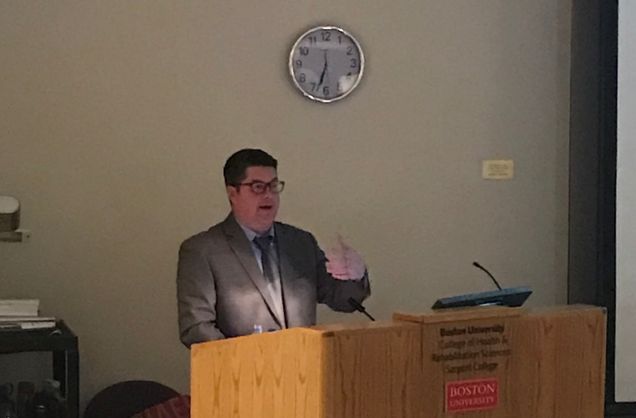
Mr. Cook began his lecture by illustrating the stakes of climate change and climate adaptability in our age, saying that “Earth is our only home, and you’d think we’d take a little bit better care of it.” But by 2050, 800 million people in 570 cities worldwide will be vulnerable to sea level rise, which should especially alarm coastal cities like Boston. Boston is even unique in its risk, as much of the city sits on built land. Boston University’s own campus sits on what used to be a tidal flat, which the city’s builders adapted to suit their needs. And once again, the city faces a critical point that demands adaptation.
As Mr. Cook phrased it, “So much is at risk if we do nothing, but we are not doing nothing.” First, he stated our ethical obligation to future generations and our neighbors to mitigate the effects of climate change. That means slashing the amount of carbon dioxide emissions that enter the atmosphere, enforcing Boston’s bag ordinance, expanding the tree canopy, and giving people the option for cleaner and more affordably energy. At the same time as trying to slow the rate of climate change, Boston must adapt in order to survive the inevitable effects of climate change. Combining science and landscape architecture, plans for a climate ready Boston include adapted buildings, elevated landscapes, and co-benefits of water access and recreation. In Mr. Cook’s words, city planners should aim to build “not a system of barriers, but of beaches, parks, and access.” These adaptive elements should improve the city as a whole, not just stop it from sinking into the ocean.
Mr. Cook emphasized that the entirety of the Climate Adaptive Boston plan is about connections, and more thoughtfully moving people towards better spaces rather than creating new ones.

Open spaces are among the first tools a city can use to foster community, adapt to climate change, create livable neighborhoods with rising housing density, and increase health and wellness. The organization Parks First, with its mission to have every citizen within a 10 minute walk of a park, has already undertaken this goal. However, Mr. Cook stressed that quality and equitability of a park outweighs the mere existence of a park. This is especially important as climate change disproportionately affects socially vulnerable communities. Such neighborhoods have a reduced ability to relocate after climate disasters, lack affordable healthcare, and increased effects with heat islands food deserts. As such, Boston not only needs to adapt to climate change quickly, but also needs to do so equitably.
The keynote lecture was followed by a brief Q&A, where audience members posed questions relating to the role of insurance companies, eminent domain, microgrids, and gentrification. While the crowd seemed to share the anxiety surrounding the politics of climate change, Mr. Cook emphasized the need to surf the wave of urgency around adaptability. Acknowledging the tough road ahead, Mr. Cook ended the evening by assuring the audience that “There will be hits and misses, and there will be big hits and big misses- but the sustainability of our species is the one agenda that matters the most.”
Hannah Dion, CAS '20
#BUCPUA Alum and Social Media Coordinator Host Visual Presentations and Portfolio Session
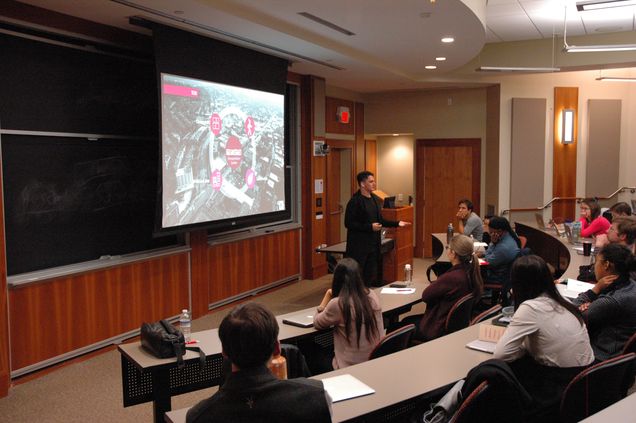
On Monday, September 24, 2018, #BUCPUA students, alumni, and guests learned how to create striking visual presentations and build compelling portfolios at the Visual Presentations and Portfolio Session, hosted by David Valecillos, and Rubén Cerón. David Valecillos received his Master in City Planning in 2014 from BU, and now is a real estate development professional at North Shore CDC focused on the planning of communities and economic development of low income neighborhoods. Rubén Cerón currently works at North Shore CDC as a Program Manager, and at Boston University’s City Planning and Urban Affairs Program as the Social Media Coordinator. He is also a candidate in the Master of City Planning program.
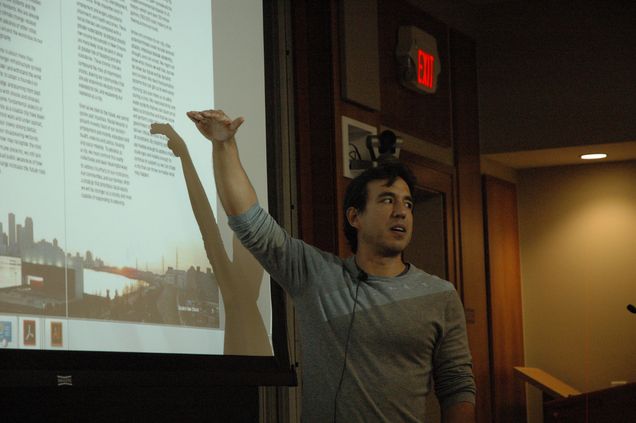
David Valecillos discussed how to create the most striking professional portfolio, and how to connect what you want to do in work, to what employers want, to who you are. Students should know how to use key elements like color, font, and structural hierarchy by importance to both catch a client’s eye and make sure the information is transmitted in the most effective way possible.
Rubén Cerón then explored how to create engaging visual presentations to best communicate one’s projects and ideas, focusing on what concepts students should remember while creating presentations, walking through the making of a presentation together, and recommendations for success. Cerón discussed how each student should ask themselves what the subject is for, who it is for, and how formal it should be in order to construct an appropriate presentation. And with all storytelling, a presentation should have a beginning, a problem, and a solution, offered by no one but the presenters themselves.

With the increasing emphasis on technology in both professional and personal life, digital, communication and technological fluency is more important than ever. After this evening, students were better prepared to market themselves and effectively spread their ideas in their future careers.
Hannah Dion, CAS '20
#BUCPUA Hosts Academic Writing and Library Research Session
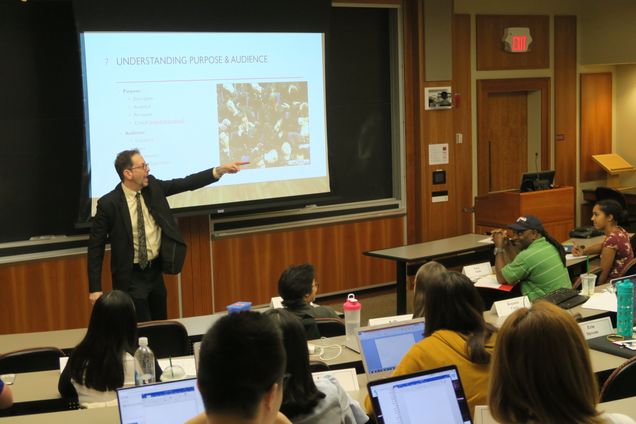
On Monday, September 17, 2018, #BUCPUA hosted an Academic Writing and Library Research Session with Dr. William Koehler, Dean of the School of Business and Communication at Regis College, and Helen Lee (MUA ‘19), the Library Coordinator at the Pickering Educational Resources Library at the Wheelock College of Education. Students and guests of Dr. Madhu Dutta-Koehler’s UA 515 History, Theory, and Planning Practice course met to learn valuable techniques to enhance their academic writing.
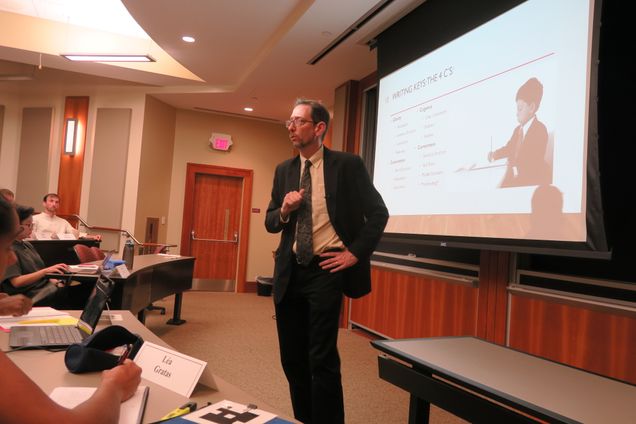
In his presentation, Dr. Koehler gave introductions on the different types of academic writings and how a student should approach each format, highlighting the ability to understand the purpose and audience of a piece. He emphasized how a well-formed process of writing an academic piece can make the end result much more coherent, keeping one’s thoughts organized from selecting a topic to creating an outline for the work.
Just as one should be meticulous when writing a piece, Dr. Koehler discussed how students should give the same attention to reading academic sources, scrutinizing them for the values and limitations of arguments, and using those skills to build their own strong arguments. The workshop concluded with Dr. Koehler working through examples of academic writing, as student applied what they had learned to their own assignments.
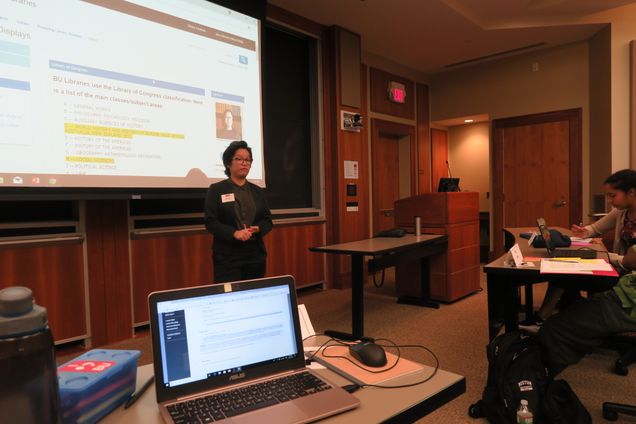
Helen Lee gave students a virtual tour of library resources and how best to use those resources to their advantages. The presentation ranged from navigating the website to understanding the Library of Congress system that BU libraries use to categorize the 2.4 million physical volumes within their collections. With that, Ms. Lee emphasized the scope of the BU library system, for while many students automatically think of Mugar as the default library, BU has 12 libraries on campus, ranging from Questrom to Theology, all open to the entire BU community.
With this combination of research and writing strategies, students can be even more prepared for both their academic and professional pursuits.
Hannah Dion, CAS'20
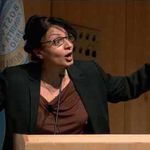
#BUCPUA Professor Addresses the Importance of Equitable Green Space
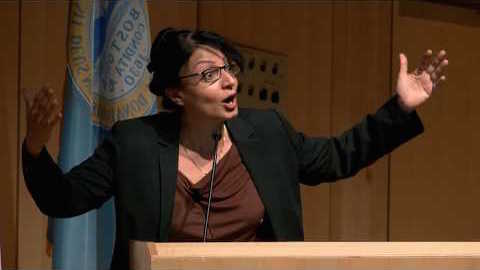
On Thursday, August 23rd, Professor Madhu Dutta-Koehler, Associate Professor of the Practice and Director, City Planning and Urban Affairs, Boston University, participated in a panel entitled "Parks for All: How City Parks Address Inequality," hosted by the Norman B. Leventhal Map & Education Center at the Boston Public Library. Professor Dutta-Koehler, along with Theodore "Ted" C. Landsmark, Distinguished Professor, Public Policy and Urban Affairs; Director, Kitty and Michael Dukakis Center for Urban and Regional Policy
In her presentation, Professor Dutta-Koehler emphasized the importance of truly equitable distribution of green space and the right every citizen has to inhabit and participate in their community. Interpreting the French philosophy of the Right to the City, Professor Dutta-Koehler stressed that every person within a city must have a “collective right and collective power to transform the city,” not just have access to its parks and buildings. City planners must take the idea that people are central to planning policy, for, as she stated, “At the heart of every issue is the question of ‘what are you going to do for the people?’” As the numerous catastrophic impacts of climate change—rising sea levels, heat waves, more frequent and violent storm activity—become more common, understanding how these dangers affect city residents is of paramount importance.
Therefore, instead of looking at parks objectively or in isolation, one must think of how these spaces directly impact the people in those areas. While statistics may place Boston 13th in the nation for green space, this does not guarantee that such spaces are equally beneficial or equitably distributed among the community. For example, heat vulnerability is highest in the middle of the city in the neighborhoods of Mattapan, Roxbury, and Dorchester, where incomes and city outreach are lowest compared to the wealthier neighborhoods of Boston. As such, for a true Right to the City and effective green spaces, Professor Dutta-Koehler claims that “The Right to the City should ensure equitable distribution of green space.”
But equitable green space means much more than ensuring everyone has access to parks, for the quality of the parks is as important as their locations are. So while The Trust for Public Land’s mission for a park within a ten-minute walk of every person is an admirable goal, just because a park exists does not mean it functions to its full potential. Kevin Essington, area director for the Trust for Public Land, asks questions such as, “who do these parks serve? What is their age, income, and ethnicity?” in his work, seeking to ensure not only that parks are accessible to everyone, but also that all parks are enjoyable, welcoming, and functional spaces. In discussing why equity matters, Ted Landsmark, professor of public policy and director of the Dukakis Center for Urban and Regional Policy, contributed how parks serve as areas of common ground, or “sites of collaborative advocacy to address inequalities.” With a more equitable distribution of high-quality, well-maintained parks, we can solve problems while bringing people together, combat isolation in cities, and join “our sense of beauty with our sense of community, along with the most extraordinary collection of people.”
In a Q&A session following the panel, Professor Dutta-Koehler and the others answered questions on how a city can achieve equitable allocation of green spaces in every sense of the word. Ensuring that parks are equitably distributed, of comparable, high value, and accessible is the first step towards a more robust park system in Boston. Something as simple as removing physical barriers to a park, such as changing the location of a door, can be immensely impactful. The panelists spoke of treating parks as infrastructure that must be maintained, rather than something that must be created new each time, to drive this process and make it more feasible. Once the parks are firmly established, programming can help attract people and drive the connections made there. However, as important as park events can be, the programming in parks is dwarfed by what the people do themselves. As Landsmark pointed out, “The people of Boston activate their own parks, and it serves as a tool against gentrification- it’s just up to us to give them the tools they need to do so.”
Watch the discussion at Parks for All: How City Parks Address Inequality
Hannah Dion, CAS '20
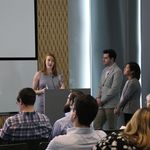
Engaging with the City: Urban Studies Capstone Presentations

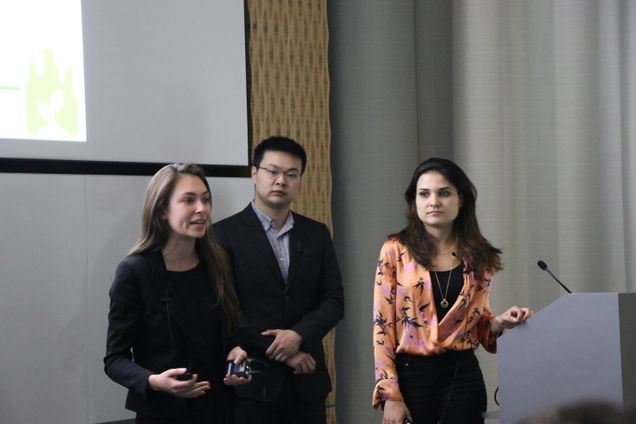
On Monday, April 23rd and Monday, April 30th, the students of the Urban Studies Capstone course presented their final projects to an audience of their peers, mentors, and distinguished guests, including Dr. S. Atyia Martin, Chief Resilience Officer for the City of Boston, Dennis Carlberg, Sustainability Director at Boston University, J. Brandon Wilson, Executive Director of the Somerville Historic Preservation Commission, Monique Yaptenco, Compliance Coordinator at Boston University, and Brian Creamer, Project Designer for Nitsch Engineering. Over the semester, students worked in groups to create a project relating to current issues in the greater Boston area, using real data and case studies to work towards real solutions. Students utilized principles in theory and practice from all areas of City Planning, Urban Affairs and Public Policy, as their projects served as the culmination of their time in the program. While gaining experience with real-world initiatives and fostering partnerships across the industry, students added an emphasis on the end of their time with BU City Planning and Urban Affairs.
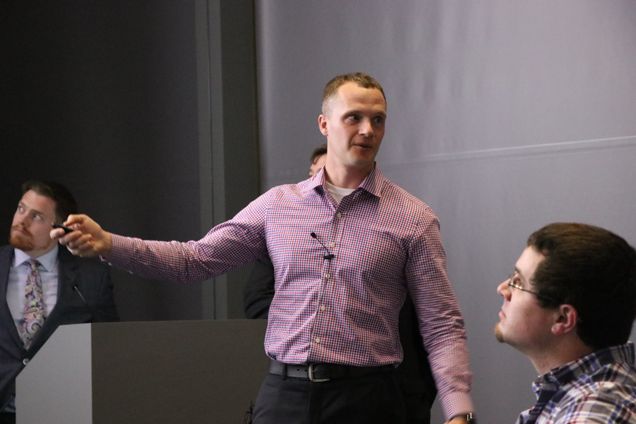
Dr. Madhu Dutta-Koehler, who led the course this semester, said that the capstone projects were designed with the idea that “practice is at the heart of all planning.” As such, Dr. Dutta-Koehler wanted the policy and planning guidelines to be scalable and replicable, so that the students can apply them to multiple situations moving forward. Not only did these projects give students a new arsenal of planning tools, knowledge, and techniques, but also they were able to effectively demonstrate their growth within the program and dedication to the field in front of those who guided them through it.
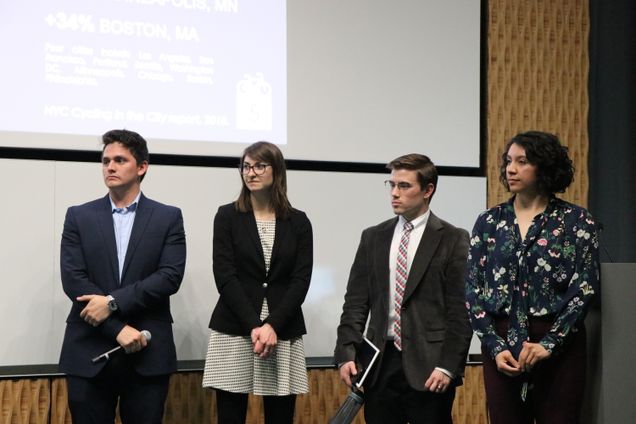
The first night of presentations focused on the Green Line Extension, the plan to extend the Green Line from Lechmere Station into Medford and Union Square in Somerville. Presentations varied within this topic, beginning with “Union Square: A Union of Plans,” which asked whether current plans and policies enable a sustainable transit oriented development for Union Square. The following group, “Parking and the Green Line Extension” suggested strategies for reducing parking requirements in Somerville in order to convert unused parking spaces into green spaces and housing. Other groups focused on the impact of this project directly on the individuals within Somerville, as “Displacement Mitigation Strategies” did. These students focused on the potential negative effects of the Green Line and ways to combat those effects, as the increased mobility provided by the six new T stops may cause housing prices to rise and displace existing residents. “Next Stop: Better Quality of Life” expressed similar concerns, but ultimately concluded the Green Line Extension would lead to cleaner air, decreased commute times, and an overall improved standard of living for the residents of Somerville.
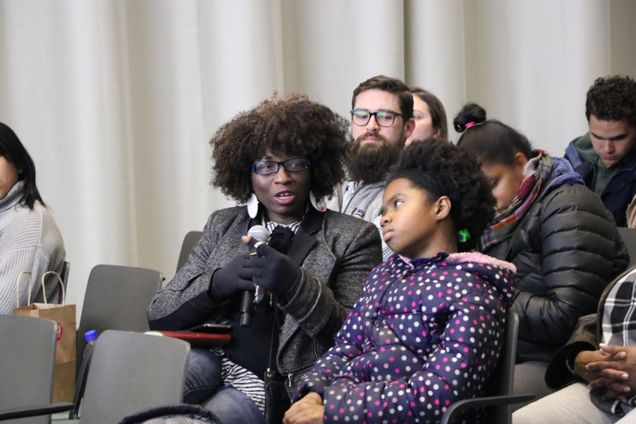
The second night of presentations shifted towards Greenovate Boston, a city initiative to reduce Boston’s greenhouse gas emissions while engaging with the public about climate change. Half of these presentations examined topics within Greenovate’s campaign, as “Roxbury Urban Agriculture” suggested to increase Boston’s resiliency by converting vacant parcels of land into various urban agriculture sites, leading to increased green space, economic growth, and accessibility to healthy food. “Boston Youth Urban Container Garden” continued the discussion of urban agriculture, and how these implementations can aid underserved youth in the city. The group “Marketing Strategies and Infrastructure Investment around Boston Bicycling” focused on how bicycling factored into
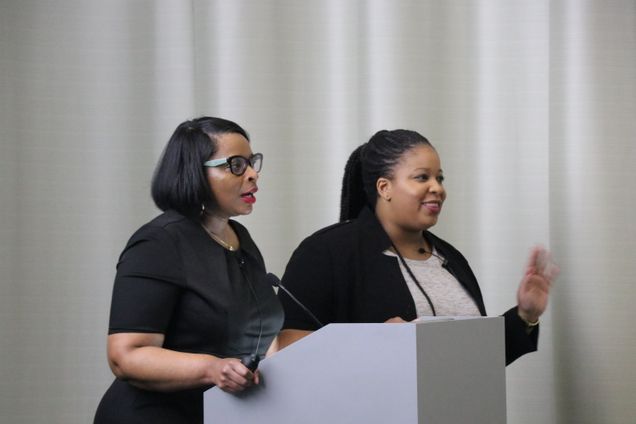
Boston’s climate goals, examining how to increase bicycle use through social media, education, fund allocation, and promotion of special events. Other groups focused on Greenovate’s effectiveness as an initiative, as “Climate Change Communication Strategies” evaluated how well Greenovate truly involves citizens in the city’s climate change action plan and informs residents of the dangers of climate change. “Prioritizing People” suggested ways to improve these communication strategies, questioning Greenovate’s ability to make complicated ideas of climate change and urban affairs clear and accessible to the public.
Each project was followed by a short question and answer session, where audience members probed for more information or suggested improvements on a study. After the presentations, students and guests discussed the content further over coffee and BU City Planning goody bags.
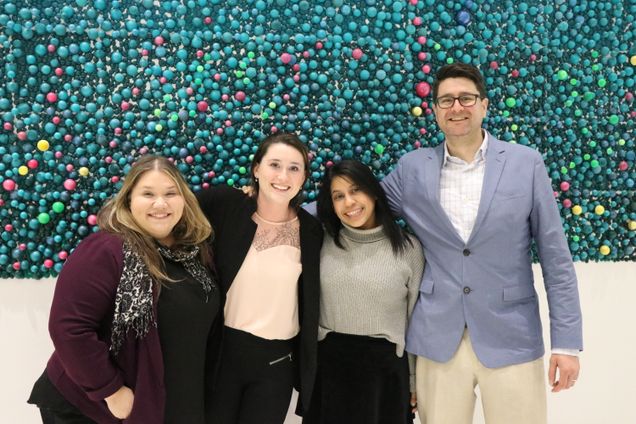
Urban Studies Capstone Presentations
Hannah Dion, CAS '20
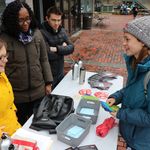
Planning a City for the Sake of the World: #BUCPUA at the Earth Day Festival
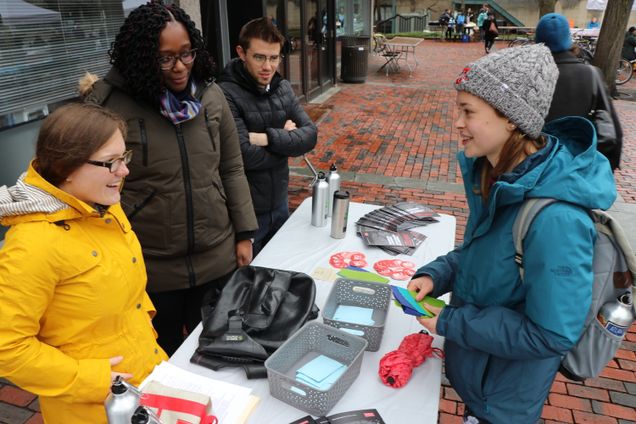
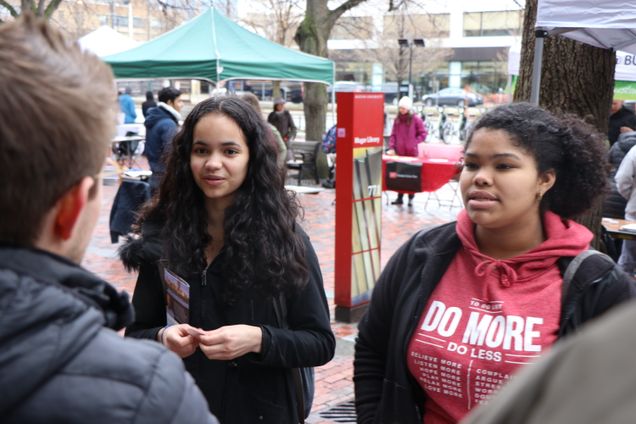
On Thursday, April 19th, members of the City Planning and Urban Affairs Urban Planning Association (UPA) hosted a booth at BU’s annual Earth Day Festival in the GSU Plaza. Even in the rain, students stopped to ask questions, inquire about the program, and play a true/false game for prizes ranging from stickers to a backpack made from upcycled bicycle tires. The game featured cards with statements varying from bike and natural gas statistics to food deserts, as students were often surprised at their own misconceptions about how humans interact with their environment.
After reading some of these statistics, students were offered a host of unique alternatives to disposable waste that surpassed everyday reusable water bottles. Among these products was the ETEE non-plastic food wraps, designed to replace plastics like sandwich bags, wraps, and grocery bags and lasting up to a year instead of a single use. Also included was a Siklo bag, a brand dedicate to an eco-ethical lifestyle by upcycling the inner tubings of bicycle tires instead of letting them sit in landfills. Most useful at the booth of all, students had a chance to discuss these implementations with UPA members, discussing the relationship between the city, the environment, and the people who depend on both.
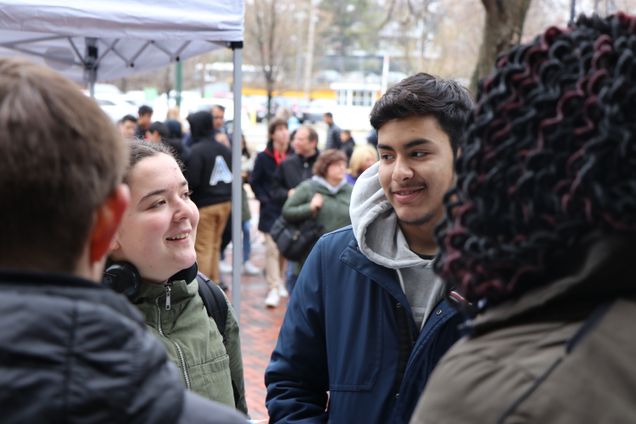
While it may seem self-evident that those who plan cities would have to consider the environment they build these cities around, there is more to this tension than the give-and-take of exchanging grass for concrete. As Rubén Cerón emphasized, “Everything is the connection- it’s the balance of everything, because as much as we need cities, we need a healthy environment to live in as well.” Cities exist for a good reason, as humans need the dynamic atmosphere and interaction found within them to develop and promote efficiency. Unfortunately, this growth of humanity and the cities themselves puts nature at risk, endangering an equally vital part of human life. Besides being essential for life on Earth, just as humans need cities to stimulate business and social interaction, nature provides a crucial escape from the pressures that accompany cities. Given this delicate balance, the responsibility falls upon city planners to evaluate and maintain the needs of both people and nature for the mutual well-being of each.
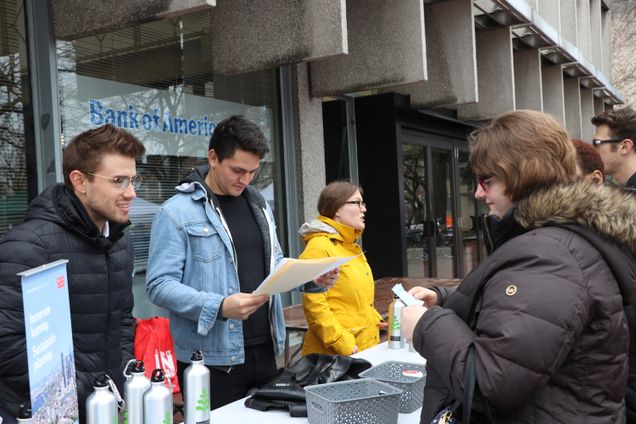
According to Cristián Casanueva, for the city planner this means highlighting the importance of facilitating multiple methods of transportation, including bike lanes, walking paths, and public transit to reduce traffic and personal cars. For conserving nature spaces themselves, planners have to consider the danger of urban sprawl, while incorporating green space into existing cities. In addition, incorporating urban farming both brings nature into the city while increasing access to affordable food for low income communities. By building with nature in mind, the city itself becomes more resilient and sustainable as a whole.
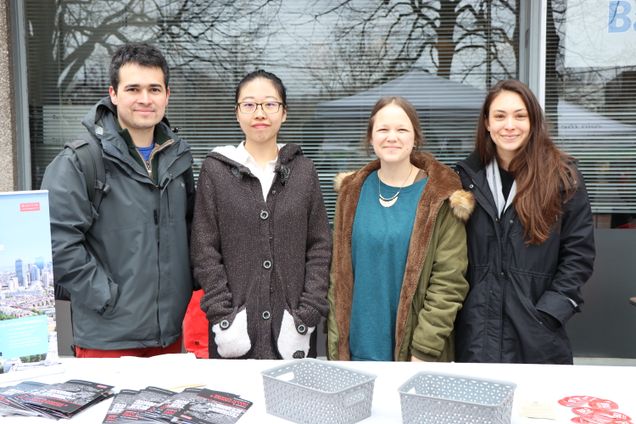
As impactful as thoughtful city planning can be, the Earth Day Festival is most significant for how it raises awareness of these issues for those unfamiliar with urban affairs or sustainability. In addition to seeing the importance of city planning, people also understand that they too can help without an advanced degree in urban affairs or environmental science. Just by making slight efforts in small things like using less plastic, gas, or buying local food, any person can play their part in helping the world around them. The smallest changes enacted in everyday life can have the biggest impact, and each year Earth Day spreads this message a little further.
Hannah Dion, CAS '20
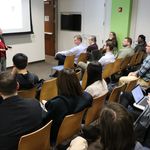
Program Accomplishments and Steps for the Future Highlighted at #BUCPUA Town Hall

On Thursday, April 12th, members of the BU City Planning and Urban Affairs Program met to reflect on past achievements and discuss the goals moving forward within the Program. Dr. Dutta-Koehler led the presentation, focusing on expanding the reach of the Program both within the current student body and for the entire university. She emphasized the desire for the faculty and students of BUCPUA to become “trailblazers” at Boston University, leading the way to a more modernized future for the community.

The night partially celebrated the Program’s recent achievements, including successfully establishing a new academic framework, content, and internship program. With heightened efforts in outreach, branding, and visibility, enrollment has grown substantially and shows no sign of slowing down. As the program continues to grow, Dr. Dutta-Koehler emphasized the creation of a strong community between the students and faculty, which increases student retention, recruitment, and satisfaction while strengthening the Program’s quality itself.

For next steps, Dr. Dutta-Koehler outlined an expansion of program activities, including field specific accreditation, international collaborations, dedicated career services, student advising, and digital media coordination. Aiming to bring BU City Planning to the forefront of the technological movement, she shared plans to pursue online and hybrid course development while taking advantage of the new Metropolitan College building set to open in August. Before adjourning for coffee and Q & A, Dr. Dutta-Koehler made a call to “make no little plans” and push BUCPUA to lead the way to BU’s brighter future.
Hannah Dion, CAS '20
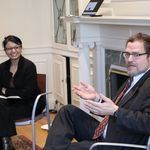
For a Resilient Community, Ask Your Neighbor for a Cup of Sugar
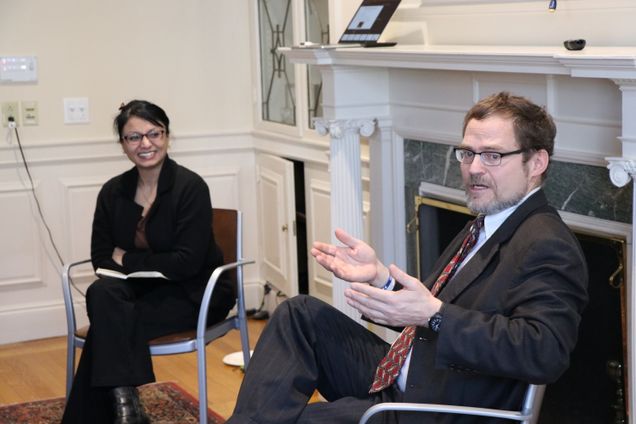
On Tuesday, February 13th, the Initiative on Cities hosted Cambridge City Councilman Craig Kelley for his seminar “Assessing and Planning for Neighborhood-Based Resiliency,” focusing on how a community should best prepare itself against both unexpected shocks and ongoing stresses. Boston University City Planning and Urban Affairs Director and Associate Professor of the Practice Dr. Madhu Dutta-Koehler moderated the discussion afterwards, answering questions ranging from sustainability to the trouble of prioritizing crises.
Kelley was a part of Cambridge's Special Committee on Neighborhood-Based Resilience, a two year initiative to identify potential and current problems within Cambridge and how to attack them from multiple angles. The committee defined resiliency as “the capacity of individuals, neighborhoods, institutions, businesses, and systems within a city to equitably survive and adapt to persistent changes, chronic stress, and acute shocks.” The committee stressed that resiliency extended to everyday problems like homelessness and drug abuse, not just preparation for the next hurricane or flood.
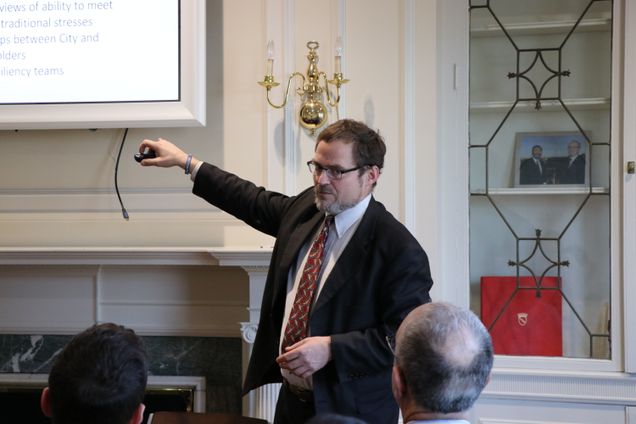
While the seminar discussed basic emergency tools for individuals like medical supplies, prescriptions, cash, and access to emergency responders, Kelley stressed the importance of trust in neighborhood connections. “In an emergency, it’s better to rely on neighbors than the government” Kelley said, adding that people are more resilient when they join together. If one person has a first aid kit, another can jump start a car, and another knows CPR, a group of average citizens form a team that can help others more effectively than emergency responders in some situations. Before people can ask for CPR, though, they have to know how to ask their neighbors for a cup of sugar. Kelley noted the hesitation to walk up to the people who live around you and start a conversation, noticing that “getting to know your neighbors is the dance we don’t know how to do.” Even so, resilience requires this social cohesion more than any government policy.
With his experience on Cambridge's Special Committee on Neighborhood-Based Resilience, Kelley shared their strategies for tackling an abstract and crucial problem like resiliency. The team had to carefully define what they hoped to accomplish and how to do so, striving to be focused and intentional in their goal. They had to be willing to take risks and forgive failures, accepting that even if some ideas did not work perfectly, the money and time invested in their endeavor would prove worthwhile for generations to come.
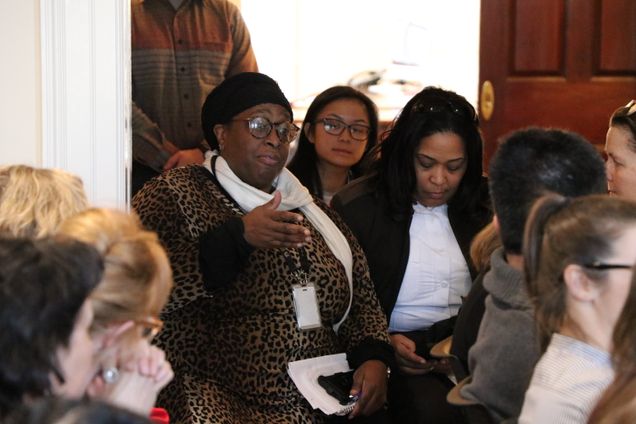
Kelley also emphasized building for the future, and not getting “stuck in anachronistic ways of thinking and ways of doing things” when it comes to planning new elements to our cities. While preventative planning like investing in flood-resistant infrastructure and zoning to reduce pavement cover in relation to the urban heat island effect help prepare cities for long-term changes, we should strive for innovative solutions and co-benefits in everyday things. Kelley gave the example of bike paths with a permeable surfaces that allow both mobility and flood management in extreme weather, showing how building with resiliency in mind leads to cities that accommodate the changing needs of the population.
Kelley and Dr. Dutta-Koehler ended with a discussion on the role of planning in resilience, and the difficult choices that those in power must make for their city. Kelly seemed optimistic in the power of great ideas from great people, but wary of the task ahead of them and the minefield of politics. “This is the last day before tomorrow, whatever tomorrow might bring… and there is more depending on getting it right that you may realize.”
Hannah Dion, CAS '20